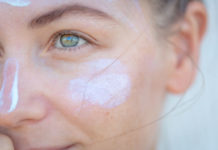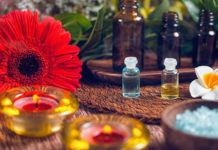
We don’t often think “sun care” during the cold winter months, assuming the sun is somehow less powerful and less damaging. Nothing could be further from the truth.
by christine cho
Whether you’re spending the winter months surfing big waves off the Pacific coast or skiing down the Rocky Mountains, your skin needs UV protection. Most of us tend to associate hot weather with sunburn; the truth is that no matter what the temperature is, UV rays can do plenty of damage.
Even if you’ve noticed some evidence of sun damage, it’s not too late! We all know the obvious protective tactics – wearing sunscreen, hats, sunglasses, etc. There are some other good ongoing habits we can develop to help us naturally defend our skin and bodies:
LIFESTYLE: Avoid as much exposure to the sun as you can; cover up your skin as much as possible, especially while skiing, jogging or doing other prolonged outdoor activities; hydrate yourself inside and out. Taking protective measures during physical outdoor activities is crucial to maintaining a healthy lifestyle during any season.
DIET: What we intake directly affects how we look and feel. Make sure to eat green, orange and red vegetables and fruits, such as spinach, kale, sweet potatoes, carrots, pumpkins, mangos, apricots, tomatoes, red bell peppers and watermelon. Dark chocolate is also beneficial, as are green and black teas. Don’t forget fish – mackerel, trout, salmon, herring and sardines.
NATURAL INGREDIENTS TO LOOK FOR:
Powerful antioxidants and anti-inflammatory properties can be found in many natural products: carotenoids (green and orange vegetables), lycopene (tomato paste and red fruits) and omega-3 fatty acids (fish).
VITAMIN & MINERAL SUPPORT:
Vitamin C (aka ascorbic acid – 160 mg). Neutralizes harmful chemicals within cells of outer layer of skin to prevent cellular and molecular damage from free radicals.
Vitamin E (30 IU). Also helps neutralize free radicals; additionally, when topically applied to skin, it helps reverse long-term effects of sun damage like wrinkles.
Vitamin A (aka retinol – 5000 IU). Maintains normal skin health.
The recommended dosage for minerals/vitamins is up for debate, so consult a professional for optimal dosage advice.
AGING BY THE DECADE
20s Start good eating habits early! Eat plenty of foods with essential fatty acids (trout, salmon, mackerel) and lots of leafy greens and
orange/red veggies and fruits. Wear sunscreen or skincare products with built-in sunscreen every day and wear sunglasses with proper
UV protective lenses.
30s Continue healthy eating! Make sure to supplement a healthy diet with the necessary vitamins and minerals.
40+ Limit sun exposure and cover up as much as possible. Treat existing sun damage with topical vitamin E (in oil form) and skincare products with extra vitamin C (ascorbic acid) and vitamin A (retinol).










